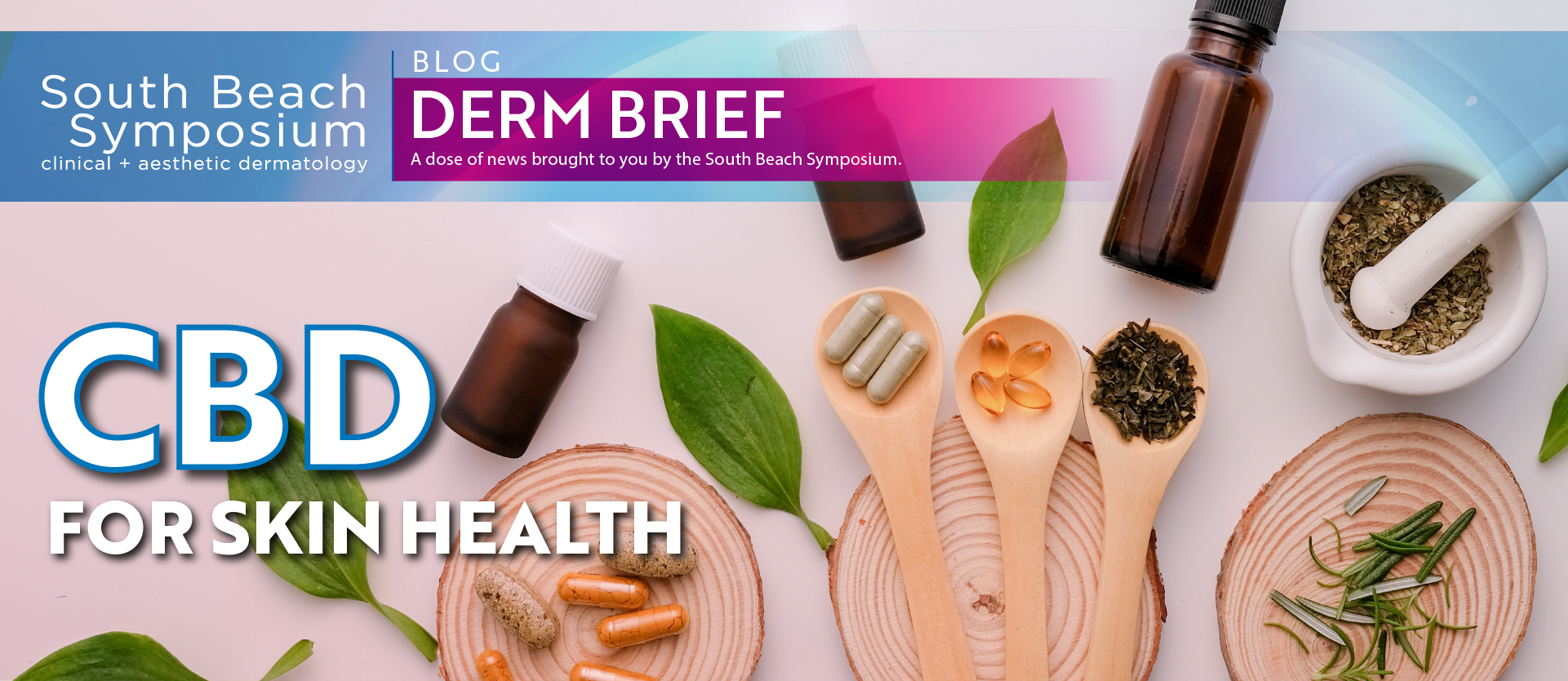From dietary supplements to daily household items, cannabidiol (CBD) has quickly grown in popularity as the new “super ingredient” added to a variety of products. Fueled by the Agricultural Improvement Act, which legalized the production of hemp in all 50 states, the rising trend of CBD usage has extended to dermatology, propelling the market of CBD-enriched skincare products.
With the hemp industry projected to grow to $20 billion by 2022, a wider body of research is needed to prove its safety and efficacy as an alternative treatment option in order to support proper regulation efforts.
Companies nationwide promote hemp-derived cannabidiol oil for its spectrum of health benefits based on anecdotal claims – partially a result of strict legal restrictions on CBD marketing. Despite the lack of medical research, consumers are turning to CBD-enriched products to alleviate symptoms of a host of health concerns in a more natural way. While some clinical studies have confirmed CBD may be effective in the treatment of chronic pain, anxiety, and a variety of other conditions, its use in skincare is relatively new and requires additional scientific evidence. However, it is increasingly being used in the treatment of skin disorders ranging from acne to rosacea due to its potential therapeutic effects.
What is CBD?
CBD, also known as cannabidiol, is a non-psychotropic chemical compound derived from the cannabis or hemp plant. Due to its negligent THC content (less than 0.3%), CBD does not induce any of the psychoactive effects commonly associated with marijuana but instead, produces a multitude of therapeutic effects in the body by stimulating endocannabinoid production.
Most often, products are infused with CBD oil comprised of CBD isolate suspended in a carrier oil – usually MCT or coconut oil. As a newly popularized compound, CBD and CBD products are not regulated by the FDA; directions for use and dosages are therefore experimental, requiring patient caution.
Benefits of CBD
Research has found CBD to have a positive impact on a variety of health conditions ranging from chronic pain and inflammation to nausea, insomnia, and anxiety. However, the largest array of clinical evidence for CBD use pertains to the treatment of childhood epilepsy. Nonetheless, anecdotal and increasingly medical claims support the wide-ranging benefits of CBD on overall health and more recently, its therapeutic effects on skin health.
Anti-Inflammatory Properties
Animal-based clinical studies have revealed the anti-inflammatory properties of CBD and its potential to significantly reduce inflammation and decrease associated pain. When incorporated into skincare products, CBD and its anti-inflammatory qualities may alleviate symptoms of dermatologic conditions such as psoriasis, eczema, and acne by reducing dryness, irritation, and redness.
The compound may have additional beneficial effects on the skin by providing moisture, relieving pain, and controlling overproduction of sebum from the sebaceous glands – making it a promising treatment for acne sufferers. Recent studies have revealed that CBD oil may be an efficacious and safe acne therapy due to its anti-inflammatory action and ability to prevent excess sebum production and the activation of inflammatory cytokines. Though results have been promising thus far, further human-based research is necessary to determine the effects of CBD on skin conditions.
Antioxidant Activity and Fatty Acid Content
CBD-infused products not only relieve pain and decrease inflammation but they also demonstrate potential soothing effects on the skin. The antioxidant activity exerted by cannabidiol could aid the skin in repairing free radical damage thus helping to smooth wrinkles and reduce breakouts and blemishes.
In addition, the beneficial nutrients found in CBD oil such as fatty acids have been proven to promote skin health. CBD-containing products are rich in omega-3 and omega-3 fatty acids which have been found to improve overall skin appearance and health.
Safety of Topical Use
Published studies proving the safety and efficacy of CBD are hard to find, however, topical use of CBD is considered safe and has no known adverse effects. The compound is being tested worldwide to determine proper dosages, regulatory measures, and its range of therapeutic or adverse effects on physical and mental health. As the CBD skincare industry is developing, further research and clinical evidence is needed before widespread product usage is encouraged.
Although there is still much to be learned about CBD and especially its impact on skin health, anecdotal and medical results implicate the compound’s potential as an alternative, natural therapy for a variety of dermatologic conditions. As the industry and market continue to grow, the prevalence of CBD-based products will likely increase in the dermatological setting.

















